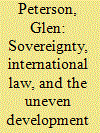| Srl | Item |
| 1 |
ID:
139677


|
|
|
|
|
| Summary/Abstract |
To what extent are different parts of the world exceptional when it comes to the history of forced migration and refugee experiences? For instance, is forced migration in Asia distinct from developments elsewhere? Or is forced migration in Asia part of wider processes of displacement and emplacement so characteristic of the modern world? Over the past few decades, the fields of refugee and forced migration studies have ballooned. Scholars in a wide range of disciplines,
including anthropology, political science, geography, and history have sought to understand the nature of population displacements in the modern world. Much of the early scholarship in this field focused on Europe in the immediate aftermath of the First and Second World Wars. Scholars have also sought to understand the nature of protracted refugee situations in Africa.More recently, scholars have investigated forced migration within globalized and transnational frameworks.
|
|
|
|
|
|
|
|
|
|
|
|
|
|
|
|
| 2 |
ID:
139678


|
|
|
|
|
| Summary/Abstract |
When we think about the history of the international refugee regime, why is it that—with a few carefully delineated exceptions—there were no non-European ‘refugees’ until the 1950s? This article offers a critical examination of existing scholarship on the history of the international refugee regime and suggests some alternative pathways for future research. The article has three broad objectives. The first is to propose an outline for an alternative history of the international refugee regime, one in which the non-European and colonial worlds are not invisible or peripheral but rather central to the main narrative. The second is to ask what place Chinese migrants might occupy in such an alternative history of human displacement, stretching over the course of the twentieth century. Finally, this article tries to show that the period from 1945 to the early 1960s was an especially critical one in the history of the international refugee regime, one in which refugee movements both out of and into the People's Republic of China were critical in generating the kinds of tensions and contradictions that emerged when the international refugee regime was transposed from Europe onto colonial and post-colonial Asia.
|
|
|
|
|
|
|
|
|
|
|
|
|
|
|
|